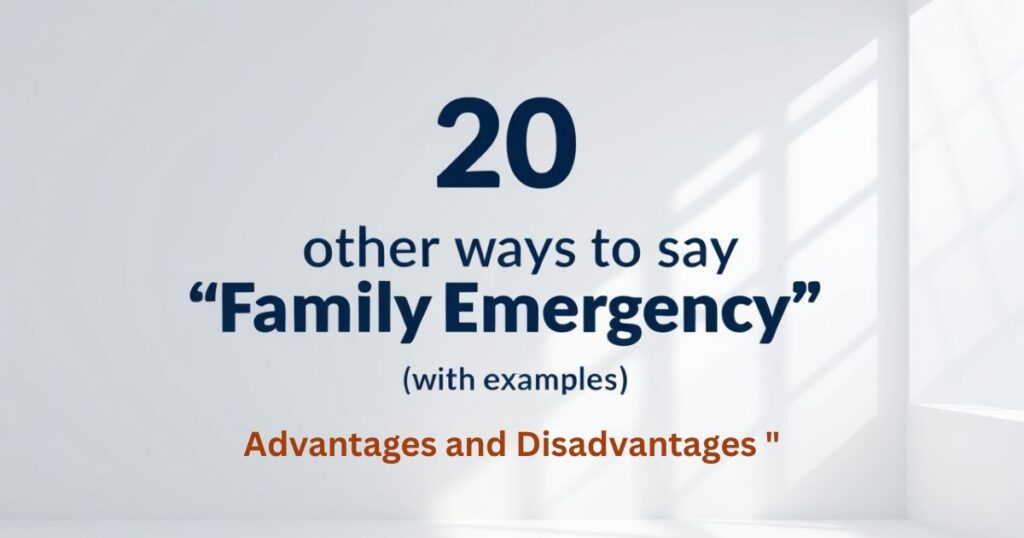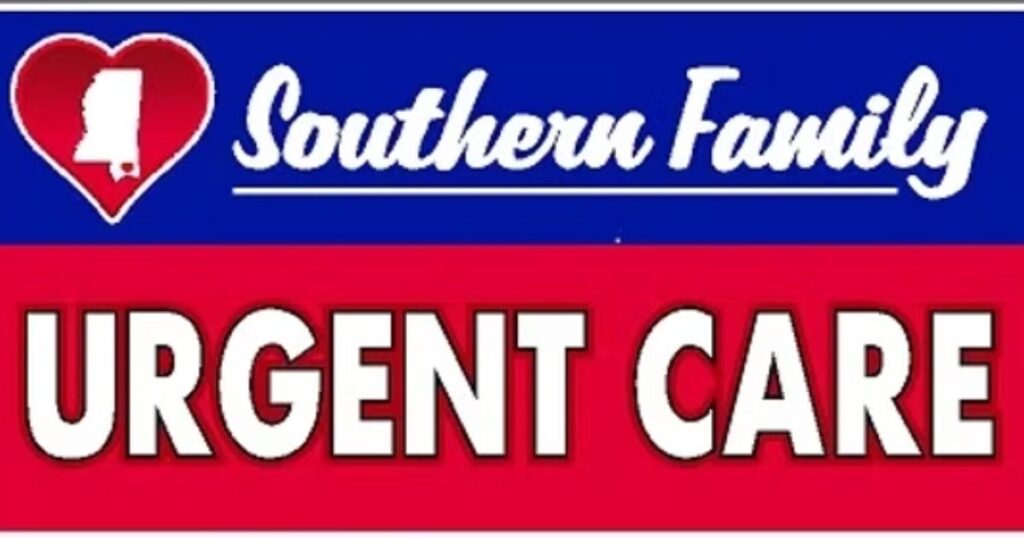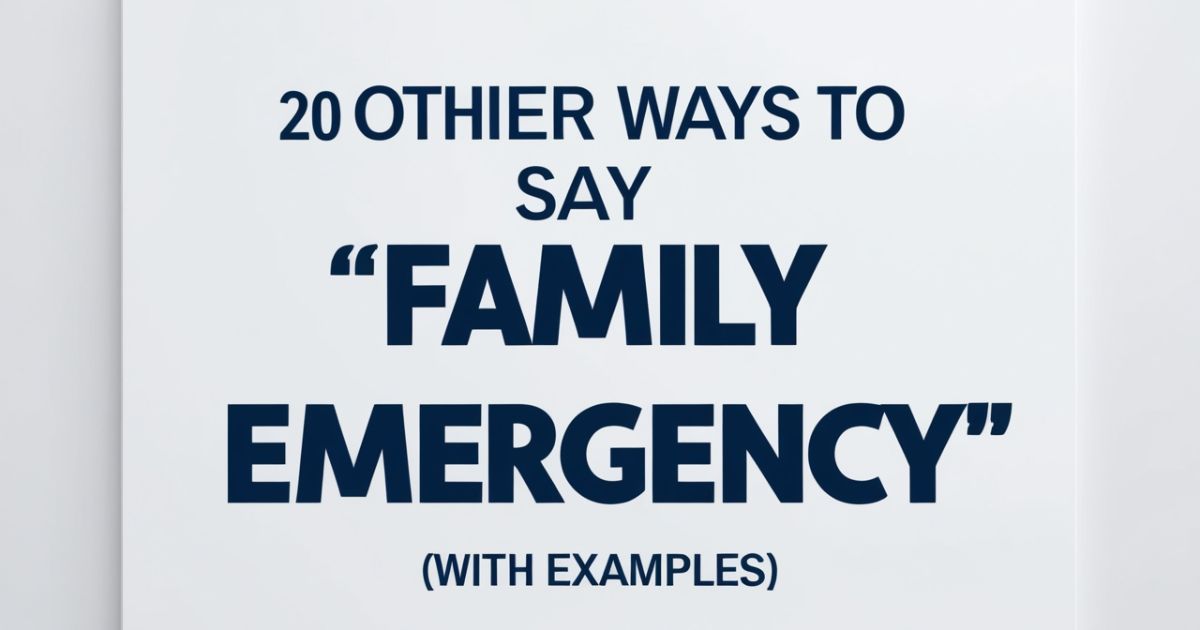Life throws curveballs when we least expect them. When family emergency situations arise, knowing how to communicate professionally while maintaining privacy becomes essential. Whether you’re writing an email to your boss or explaining an absence to colleagues, the right words make all the difference.
What Does “Family Emergency” Mean?
A family emergency refers to any urgent, unplanned situation involving a family member that demands immediate attention. These circumstances often require you to leave work suddenly or adjust your schedule without advance notice.
Common examples of family emergencies include medical crises, accidents, sudden hospitalizations, or situations where a loved one needs immediate care. The key characteristic is urgency – these are situations that cannot wait for a more convenient time.
Understanding what constitutes a family emergency helps you communicate more effectively with employers and colleagues. It’s not just about the words you choose, but also about conveying the genuine need for immediate action while respecting workplace protocols.
Is It Professional to Say “Family Emergency” in the Workplace?
Using the phrase “family emergency” is generally acceptable in professional settings, but it may not always be the most effective choice. While universally understood, this standard terminology can sometimes feel impersonal or overly generic.
Professional communication during personal crises requires balancing transparency with privacy. Your choice of words should reflect the severity of the situation while maintaining appropriate boundaries with colleagues and supervisors.
The professional way to say family emergency often depends on your workplace culture, relationship with your supervisor, and the specific circumstances involved. Some environments welcome more detailed explanations, while others prefer minimal information.
Advantages and Disadvantages of Using “Family Emergency”

Understanding the pros and cons of standard family emergency terminology helps you make informed communication decisions during stressful situations.
Advantages
Universal recognition stands as the primary benefit of using “family emergency.” Everyone immediately understands the implications and urgency associated with this phrase. Most supervisors and HR departments have established protocols for handling family emergency situations.
Immediate clarity eliminates confusion about why you need time off or schedule adjustments. The term carries inherent weight that typically prevents unnecessary questions or delays in approval processes.
Established precedent exists in most workplaces for family emergency leave policies. Using standard terminology aligns with existing procedures and documentation requirements.
Disadvantages
Lack of personal touch represents the main drawback of generic emergency language. The phrase can sound cold or impersonal, potentially missing opportunities to build empathy and understanding with colleagues.
Limited context may not adequately convey the specific nature or expected duration of your situation. This ambiguity can create challenges for workplace planning and support.
Overuse concerns arise when the same phrase appears repeatedly in communications, potentially diminishing its impact or creating skepticism about the situation’s legitimacy.
20 Professional Alternatives to “Family Emergency”
Here are 20 other ways to say family emergency with examples that provide more nuanced communication options for various professional situations.
| Alternative Phrase | Best Used When | Professional Tone |
|---|---|---|
| Personal Family Matter | Need privacy without details | Respectful, discrete |
| Family Health Issue | Medical situations involved | Serious, empathetic |
| Family Crisis | Severe, critical situations | Urgent, grave |
| Unexpected Family Situation | Sudden, unplanned events | Professional, explanatory |
1. Personal Family Matter
Personal family matter provides an excellent alternative to family emergency when you need to maintain privacy while explaining your absence. This phrase respects professional boundaries while indicating the personal nature of the situation.
Example: “I need to leave early today to address a personal family matter that requires my immediate attention.”
This family emergency synonym works particularly well in formal communications where you want to provide explanation without extensive detail.
2. Family Health Issue

When dealing with medical situations, family health issue offers a more specific professional way to say family emergency. This terminology immediately conveys the health-related nature of your concern while maintaining appropriate privacy.
Example: “I’m requesting leave to handle a family health issue that requires my presence at the hospital.”
This phrase demonstrates empathetic communication while providing sufficient context for supervisors to understand the situation’s gravity.
3. Family Crisis
Family crisis represents one of the strongest family emergency synonyms available for severe situations. This term conveys maximum urgency while remaining professionally appropriate.
Example: “I must leave immediately due to a family crisis that demands my urgent attention.”
Use this alternative expression for emergencies when the situation truly represents a critical moment requiring immediate response.
4. Unexpected Family Situation
This polite excuse for leaving work acknowledges the unplanned nature of your absence while maintaining professional tone. Unexpected family situation works well when you need to explain sudden schedule changes.
Example: “An unexpected family situation has arisen that requires me to adjust my schedule today.”
This phrase exemplifies tactful way to explain emergency without oversharing personal details.
5. Family Emergency Situation

Family emergency situation provides slight variation from standard terminology while maintaining the urgency factor. This professional emergency phrase adds formality without losing impact.
Example: “I’m dealing with a family emergency situation that requires my immediate departure from the office.”
6. Personal Emergency
Personal emergency offers maximum privacy while indicating urgent circumstances. This urgent family excuse works when family details must remain completely confidential.
Example: “I have a personal emergency that requires my immediate attention and will need to leave work early.”
7. Family Issue Requiring Immediate Attention
This detailed family emergency wording clearly communicates both urgency and the need for prompt action. The phrase works well in formal way to mention emergencies.
Example: “I have a family issue requiring immediate attention and will need to take emergency leave today.”
8. Family Concern
Family concern provides a gentler alternative to family emergency while still indicating the need for attention. This compassionate language at work softens the message without diminishing importance.
Example: “I have a pressing family concern that needs my attention this afternoon.”
9. Family Obligation

This phrase shifts focus from crisis to responsibility, making it an appropriate leave of absence reason for ongoing situations requiring attention.
Example: “I need to fulfill a family obligation that requires my immediate presence.”
10. Family Matter That Needs Immediate Attention
This comprehensive urgent family situation description provides clear explanation while maintaining professional boundaries.
Example: “I have a family matter that needs immediate attention and will require me to leave early today.”
11. Immediate Family Matter
Immediate family matter emphasizes both urgency and the close relationship involved, making it effective for HR leave request language.
Example: “I must address an immediate family matter and will need emergency time off.”
12. Family Situation Requiring Urgent Care
This family emergency synonym specifically indicates caregiving responsibilities while maintaining professional tone.
Example: “I have a family situation requiring urgent care that demands my immediate attention.”
13. Family Matter of Urgency

This formal professional emergency phrase conveys seriousness while remaining appropriately vague about specific details.
Example: “I must attend to a family matter of urgency that cannot be postponed.”
14. Family-related Urgent Situation
This alternative expression for emergencies provides broad coverage while maintaining professional communication standards.
Example: “I’m dealing with a family-related urgent situation that requires my immediate response.”
15. Immediate Family Emergency
Immediate family emergency specifies that the situation involves close relatives while maintaining urgency indicators.
Example: “I have an immediate family emergency that requires me to leave work right away.”
16. Family Care Obligation
This respectful emergency explanation focuses on caregiving responsibilities rather than crisis elements.
Example: “I need to attend to a family care obligation that requires my immediate presence.”
17. Family Urgency
Family urgency provides concise communication while maintaining professional appropriateness for urgent leave message ideas.
Example: “I have a family urgency that requires my immediate attention today.”
18. Family Emergency Involving a Loved One
This empathetic communication approach adds emotional context while maintaining professional boundaries.
Example: “I’m dealing with a family emergency involving a loved one that requires my immediate care.”
19. Personal Family Issue Requiring Immediate Attention
This comprehensive urgent family excuse provides complete explanation while respecting privacy boundaries.
Example: “I have a personal family issue requiring immediate attention that necessitates emergency leave.”
20. Urgent Family Excuse

Urgent family excuse offers direct communication for situations requiring immediate explanation and action.
Example: “I need to use an urgent family excuse to leave work early for a pressing family matter.”
How to Communicate Family Emergencies Professionally
Managing work and personal life during emergencies requires strategic communication that balances transparency with privacy. Your approach should reflect both the urgency of your situation and respect for professional protocols.
Appropriate emergency excuses begin with clear, honest communication delivered as soon as possible. Whether you’re sending an email or making a phone call, immediate notification helps your team adjust workflows and responsibilities.
Consider your audience when selecting privacy-respecting phrases. Communications with close colleagues might include slightly more context than formal notifications to HR or senior management.
Best Practices for Emergency Workplace Communication
Urgent situation communication succeeds when you follow established protocols while adapting to specific circumstances. Always notify your immediate supervisor first, followed by team members who may be affected by your absence.
Supportive professional messaging includes offering brief updates when appropriate and providing estimated timelines for your return when possible. This approach demonstrates responsibility while managing workplace expectations.
Document your communications appropriately for HR requirements while maintaining sensitive situations vocabulary that respects both your privacy and professional obligations.
Frequently Asked Questions
What is a family emergency example?
Example of a family emergency includes situations like a parent’s sudden hospitalization, a child’s serious accident, or a spouse requiring immediate medical attention. These circumstances demand immediate response and cannot be scheduled for more convenient times.
How to professionally call out for a family emergency?
How to explain absence at work begins with immediate communication using clear, respectful language. Contact your supervisor directly, provide brief context using professional emergency phrases, and indicate your expected return timeline when possible.
How do you tell your boss that you have a family emergency?
Polite excuse messages should be direct and honest while maintaining appropriate boundaries. Use phrases like “I have a family emergency that requires my immediate attention” followed by your expected availability for updates or return.
What is the best excuse for a family emergency?
The most effective urgent family excuse is truthful communication using respectful emergency explanation that matches the situation’s severity. Avoid exaggeration while ensuring your message conveys the genuine need for immediate attention.
Conclusion
Expressing personal emergencies professionally requires thoughtful word choice that balances urgency with respect for workplace relationships. These 20 other ways to say family emergency with examples provide flexibility for various situations while maintaining professional standards.
Alternative expressions for emergencies help you communicate more effectively by matching your language to specific circumstances and audiences. Whether you need formal way to mention emergencies or more personal compassionate language at work, having diverse options ensures appropriate communication during stressful times.
Remember that effective crisis wording that respects boundaries demonstrates emotional intelligence and professional maturity. By mastering these family emergency synonyms and professional emergency phrases, you create stronger workplace relationships that support both your career and personal well-being during challenging times.

Faraz Babar is a skilled wordsmith with a keen interest in the rich world of synonyms and language nuances. With a flair for simplifying complex vocabulary, he crafts content that’s both enlightening and enjoyable to read.











